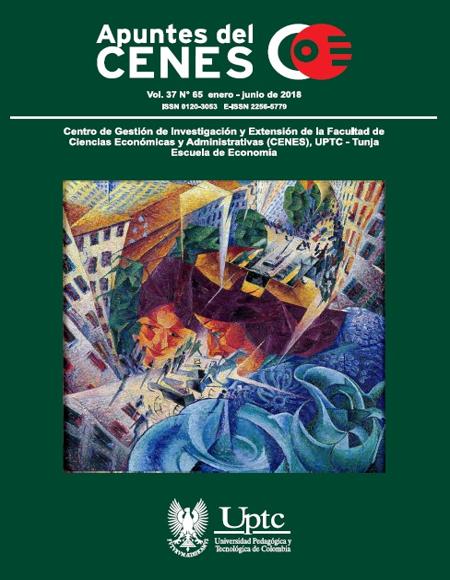Renta negativa y decrecimiento económico

Resumen
El objetivo del autor en este texto es la defensa de la siguiente hipótesis de trabajo: el creciente uso, alteración y extracción de recursos naturales, y la especulación monetaria, generan diversas rentas pero implican substracción de recursos no renovables y, además, generan una magnificada y acelerada degradación de la naturaleza, y producen costes sociales, por lo que la rentas deberían ser negativas. La metodología empleada consiste en exponer una lectura crítica del concepto convencional de renta y, con base en teorías económicas heterodoxas y no convencionales, y alguna evidencia empírica tomada de fuentes secundarias, hallar un resultado teórico, el cual consiste en la propuesta de renta negativa. Concretamente se discuten las rentas de combustibles fósiles, del oro, y del dinero. Al final se muestran algunas pautas de cómo funcionaría la renta negativa. La principal implicación de este estudio es que la renta negativa conduce a una política económica orientada hacia el decrecimiento.
Palabras clave
bioeconomia, extractivismo, entropía, renta, interés, decrecimiento, incentivos.
Biografía del autor/a
Freddy Eduardo Cante Maldonado
Doctor en Ciencias Económicas de la Universidad Nacional de Colombia. Profesor Titular de la Facultad de Ciencia Política, Gobierno y Relaciones Internacionales.
Referencias
- Bastiat, F. (2004). Obras Escogidas. Madrid: Unión Editorial.
- Biblia. (2000, 15 de enero). Génesis. Recuperado de http://www.bibliacatolica.com.ar/genesis-1.html
- Bland, A. (2014, 14 de febrero). The Environmental Disaster, that Is the Gold Industry. Retrieved from http://www.smithsonianmag.com/science-nature/environmental-disaster-gold-industry-180949762/?no-ist
- Bonaiuti, M. (2011). From Bioeconomics to Degrowth: Georgescu-Roegen's "New Economics" in eight essays (First ed.). New York : Routledge.
- Boulding, K. (1966). The Economics of the Coming Spaceship Earth. En H. Jarret, Resources for the Future (pp. 3-14). Baltimore: Johns Hopkins University Press.
- Boulding, K. (1976). La economía del amor y el temor: una introducción a la economía de las donaciones. Madrid: Alianza.
- Cleveland, C. (1999). Biophysical Economics: From Phsiocracy to Ecological Economics and Industrial Ecology. En K. Mayumi, Bioeconomics and Sustainability: Essays in Honor of Nicholas Georgescu-Roegen (pp. 125-154). Northampton, Mass.: Edward Elgar.
- Daly, H. (1999). How Long Can Neoclassical Economist Ignore the Contributions of Georgescu-Roegen? En K. Mayumi, Bioeconomics and Sustainability (pp. 13-25). Northamptom, Mass.: Edward Elgar.
- European Comission. (2012, 18 de oct.). The Environmental Impact of Gold Production. Retrieved from http://ec.europa.eu/environment/integration/research/newsalert/pdf/302na5_en.pdf
- George, H. (1997). Progress and Poverty: An Inquiry in the Cause of Industrial Depressions and of Increase of Want with Increase of Wealth... The Remedy. New York: Cosimo Books.
- Georgescu-Roegen, N. (1971). The Entropy Law and the Economic Process. Boston: Harvard University Press. https://doi.org/10.4159/harvard.9780674281653 DOI: https://doi.org/10.4159/harvard.9780674281653
- Georgescu-Roegen, N. (1976). Energy and Economic Myths: Institutional and Economic Essays. Toronto: Pergamon Press. DOI: https://doi.org/10.2307/1056148
- Goldsmith, E. (1985). Is Development the Solucion or the Problem. The Ecologist, 210-219.
- Graeber, D. (2011). Debt: The First 5,000 Years. London: Melville House.
- Hardin, G. (1968). The Tragedy of the Commons. Science, 1243-1248. DOI: https://doi.org/10.1126/science.162.3859.1243
- Hardin, G. (1993). Living within Limits: Ecology, Economics, and Population Taboos. New York : Oxford University Press. DOI: https://doi.org/10.1093/oso/9780195078114.001.0001
- Helm, D. (2016). The Future of Fossil Fuels, Is it the End? Oxford Review of Economic Policy, 191-205. DOI: https://doi.org/10.1093/oxrep/grw015
- Hirsch, F. (1976). Social Limits to Growth. Cambridge Mass.: Harvard University Press. https://doi.org/10.4159/harvard.9780674497900 DOI: https://doi.org/10.4159/harvard.9780674497900
- International Agency Energy -IEA- (2013, 5 de oct.). International Agency Energy. Recuperado de www.iea.org.
- Keynes, J. M. (1990). The General Theory of Interest, Employment and Money. Chicago: Encyclopaedia Britannica.
- La-Boetié, E. (2000, 1 de enero). The Politics of Obedience: The Discourse of Voluntary Servitude. Retrieved from https://mises.org/library/politics-obedience-discourse-voluntary-servitude
- Latouche, S. (2015). Pequeño tratado del decrecimiento sereno. Barcelona: Icaria.
- Martínez, J. (2001). Economía ecológica y política ambiental. México: Fondo de Cultura Económica.
- Mayumi, K. (2012). The Origin of Ecological Economics: The Bioeconomics of Georgescu-Roegen. New York : Routledge.
- Miernyk, W. (1999). Economic Growth Theory and the Georgescu-Roegen Paradigm. En K. Mayumi, Bioeconomics and Sustainability (págs. 69-82). Northampton, Mass: Edward Elgar.
- Platón. (1998). Protágoras. Madrid: Alianza.
- Polanyi, K. (2001). The Great Transformaton: The Poltical and Economic Origins of our Time. Boston: Beacon Press.
- Qingmin, M. (2016). The Impacts of Fracking on the Environment: A Total Environmental. Science of the Total Environment, 953-957. DOI: https://doi.org/10.1016/j.scitotenv.2016.12.045
- Ramonet, I. (2015, 1 de junio). La nueva geopolítica del petróleo. Recuperado de http://www.monde-diplomatique.es/?url=editorial/0000856412872168186811102294251000/editorial/?articulo=9717e131-315e-4440-a96d-e69686340af6
- Ricardo, D. (1993). Principios de economía política y tributación. México: Fondo de Cultura Económica.
- Russi, D. et al. (2003). Deuda ecológica: ¿quién debe a quién? Barcelona: Icaria.
- Sábato, E. (1951). Hombres y engranajes. Buenos Aires: Emecé.
- Schumacher, E. F. (1973). Small is Beautiful (First ed.). New York: Harper Collins.
- Sen, A. (1993). Markets and Freedoms: Achievements and Limitations of the Market Mechanism in Promoting Individual Freedoms. Oxford Economic Paper, 519-541. https://doi.org/10.1093/oxfordjournals.oep.a042106 DOI: https://doi.org/10.1093/oxfordjournals.oep.a042106
- Shaikh, A. (2004). The Power of Profit. Social Research, 371-382. DOI: https://doi.org/10.1353/sor.2004.0046
- Suarez, A. (2013). La minería colonial del siglo XXI, no todo lo que brilla es oro. Bogotá: Aurora.
- Ucsusa. (2015, 1 de dic.). Union of Concerned Scientist. Recuperado de falta el link
- Veblen, T. (1899). The Theory of the Leisure Class: An Economic Study of Institutions. New York: MacMillan.
- Worldgoldcouncil. (2015, 13 de agosto). World Gold Council. Retrieved from http://www.gold.org/supply-and-demand/gold-demand-trends
